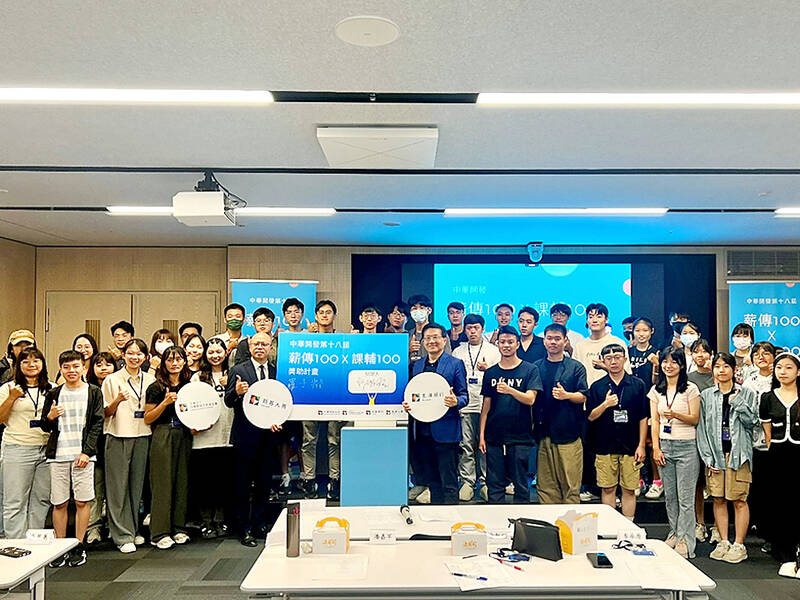Since Mr. Angelo Koo Jr. assumed the role of Chairman of the China Development Foundation in 2006, he has committed to supporting various educational and public welfare initiatives, directing the foundation to promote talent cultivation programs. Recently, the foundation held a briefing session for the 18th “ Tutoring Legacy Scholarship” program on September 5th. The university students who were awarded scholarships this year gathered together to learn financial management knowledge from professional advisors at KGI Bank, helping them to outline their future happiness equations.
The “Tutoring Legacy Scholarship” program awards outstanding university students from low-income families from various universities across the country. The foundation invited professional advisors from KGI Bank to tailor and design “financial literacy” courses for these young students. Wayne Hsu, President of KGI Bank, stated that the “Tutoring Legacy Scholarship” program of China Development Foundation alleviates the financial burden on young students and fosters their self-worth recognition. KGI Bank promotes financial literacy education for the youth, embodying Chairman Koo’s directive that “education is the most valuable investment” as part of their public welfare strategy.
University students who receive the scholarship are required to dedicate 100 hours as tutors for underprivileged children, encouraging them to seek positive motivation. Lin, a student who benefited from the Tutoring Legacy Scholarship program 10 years ago, has now become a tutoring mentor herself. She expressed great joy in being able to give back to underprivileged children now that she has grown up and is capable of doing so. Lin said, “The Tutoring Legacy Scholarship program has brought me the fortune of acquainting my tutoring mentor back then and has granted me the opportunity to pass on the spirit of the program.”

Photo: China Development Foundation
The China Development Foundation’s “Tutoring Legacy Scholarship” program has been established since 2007, awarding a total of 87 million NTD in scholarships and impacting the life experiences of over 1,700 children. In the future, KGI Financial will continue to focus on educational issues through its foundation, fulfilling corporate social responsibility.

KEEPING UP: The acquisition of a cleanroom in Taiwan would enable Micron to increase production in a market where demand continues to outpace supply, a Micron official said Micron Technology Inc has signed a letter of intent to buy a fabrication site in Taiwan from Powerchip Semiconductor Manufacturing Corp (力積電) for US$1.8 billion to expand its production of memory chips. Micron would take control of the P5 site in Miaoli County’s Tongluo Township (銅鑼) and plans to ramp up DRAM production in phases after the transaction closes in the second quarter, the company said in a statement on Saturday. The acquisition includes an existing 12 inch fab cleanroom of 27,871m2 and would further position Micron to address growing global demand for memory solutions, the company said. Micron expects the transaction to

Nvidia Corp’s GB300 platform is expected to account for 70 to 80 percent of global artificial intelligence (AI) server rack shipments this year, while adoption of its next-generation Vera Rubin 200 platform is to gradually gain momentum after the third quarter of the year, TrendForce Corp (集邦科技) said. Servers based on Nvidia’s GB300 chips entered mass production last quarter and they are expected to become the mainstay models for Taiwanese server manufacturers this year, Trendforce analyst Frank Kung (龔明德) said in an interview. This year is expected to be a breakout year for AI servers based on a variety of chips, as

Global semiconductor stocks advanced yesterday, as comments by Nvidia Corp chief executive officer Jensen Huang (黃仁勳) at Davos, Switzerland, helped reinforce investor enthusiasm for artificial intelligence (AI). Samsung Electronics Co gained as much as 5 percent to an all-time high, helping drive South Korea’s benchmark KOSPI above 5,000 for the first time. That came after the Philadelphia Semiconductor Index rose more than 3 percent to a fresh record on Wednesday, with a boost from Nvidia. The gains came amid broad risk-on trade after US President Donald Trump withdrew his threat of tariffs on some European nations over backing for Greenland. Huang further

HSBC Bank Taiwan Ltd (匯豐台灣商銀) and the Taiwan High Prosecutors Office recently signed a memorandum of understanding (MOU) to enhance cooperation on the suspicious transaction analysis mechanism. This landmark agreement makes HSBC the first foreign bank in Taiwan to establish such a partnership with the High Prosecutors Office, underscoring its commitment to active anti-fraud initiatives, financial inclusion, and the “Treating Customers Fairly” principle. Through this deep public-private collaboration, both parties aim to co-create a secure financial ecosystem via early warning detection and precise fraud prevention technologies. At the signing ceremony, HSBC Taiwan CEO and head of banking Adam Chen (陳志堅)